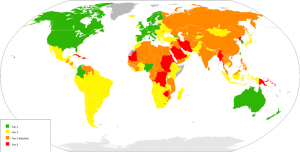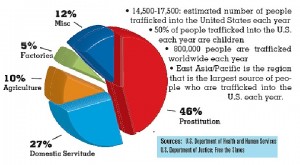If I asked you what your idea of a perfect world would be you may say something like “I want to see the end of poverty”, or “I would like to see the end of war and destruction.” For me, I want to see the end of human trafficking. Human trafficking is the forced service of a human being to perform sexual acts, debt bondage, or domestic and forced servitude and also includes child soldiers and child sex trafficking. Of course human trafficking is a horrific crime suffered by people all over the world and any one of the factors just mentioned is terrible enough to understand why we need its elimination. However, the other reason this is an issue so close to my heart and on my mind constantly is because human trafficking funds international terrorism and gives it the means to continue.
The U.S. State Department is the World’s Watch Dog over human trafficking affairs. The State Department issues an annual Trafficking In Persons Report in which they list every country in the world and rate their participation in addressing human trafficking issues in their own country in accordance with the Trafficking Victims Protection Act which sets the bar for minimum compliance. Tier 1 is an acceptable level of participation to actively stop trafficking. Tier 2 is somewhat of a middle level or what we may call a “needs improvement” level. Tier 3 is completely unacceptable and means that particular country is lacking of any involvement or is unwilling to address the issue.
list every country in the world and rate their participation in addressing human trafficking issues in their own country in accordance with the Trafficking Victims Protection Act which sets the bar for minimum compliance. Tier 1 is an acceptable level of participation to actively stop trafficking. Tier 2 is somewhat of a middle level or what we may call a “needs improvement” level. Tier 3 is completely unacceptable and means that particular country is lacking of any involvement or is unwilling to address the issue.
Tied to this tier rating system are possible economic sanctions from the U.S. after a country is rated continuously as a Tier 3. However the sanctions don’t involve humanitarian or non-trade sanctions. The question of course is how effective is the State Department’s system? That is a difficult question to answer as every year more countries come into compliance and some slip behind. Sometimes a countries’ government will take steps to educate the general public or stop sex trafficking within certain communities. Other times countries will slip and get moved back a tier as they have fallen out of compliance when trafficking activities increase.
Although the system is not fool proof and is not the direct answer to ending human trafficking, it is the best system currently in place and it is a start. Also recently, the  U.S. was added to the list last year in 2011 for the first time which set forth an acknowledgement of the fact that the U.S. has trafficking problems along with the rest of the world. This inclusion also sent a strong message that the U.S. is going to address their own problems at home as well as abroad.
U.S. was added to the list last year in 2011 for the first time which set forth an acknowledgement of the fact that the U.S. has trafficking problems along with the rest of the world. This inclusion also sent a strong message that the U.S. is going to address their own problems at home as well as abroad.
What could be improved with regards to this system or is there a better system we could use? The truth is that some of these countries don’t have the resources to attack the root of the problem which is that human trafficking creates a ridiculous amount of repeat revenue. Ponder this, a drug such as cocaine or heroine can be sold as a product once. A human being can be sold over and over again in the form of prostitution, domestic servitude, or even as a child soldier or organ donor. The profit from this crime is outrageous and some countries have terrorist organizations utilizing trafficking to fund their activities. In some situations the terrorist organization has a higher level of revenue than the government of the country or region in which they reside. In these situations it is almost impossible for the government to control or combat trafficking.
One way to improve the situation is to gain global power and momentum. The U.S. carries a huge burden in trying to oversee the global human trafficking issue. Perhaps if the U.S. was to try to partner with other global super powers such as China, India and Brazil to develop a conglomerate power over sanctioning other countries not in compliance and/or to pool resources to support efforts to end trafficking it might prove more successful. However, prior to taking that action these countries would need to address their own trafficking issues.
Regardless, I believe the answer to the beginning of the end of human trafficking is to realize the connection to terrorism that it holds, educate the public and international community on the importance of the issue, and finally to change global and domestic public policy to address the issue in a way in which lasting and permanent change can be made. It is not enough to just educate, monitor and sanction. We need to continuously analyze how public policy can be improved to end human trafficking.
Sarah Anderson is working towards her Ph.D. at Nova Southeastern University with a focus on Conflict Analysis and Resolution. She also holds a Master’s degree in Diplomacy with a concentration in international conflict resolution from Norwich University. Sarah has ten years of experience working in plaintiff’s civil litigation with an emphasis on civil rights issues. She has experience in community mediation, restorative justice, and community conflict resolution. She has a general passion for Diplomacy and improved Public Policy Change with regards to issues of terrorism and human trafficking. Sarah’s focus areas with the SISGI Group are global public policy on terrorism and human trafficking, the growth of U.S. domestic poverty, and international women’s issues.

